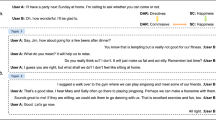Abstract
This paper proposes a method to exploit and integrate dialogue context information into two neural models for dialogue act detection, including recurrent networks and transformers networks. The proposed models are evaluated on two standard benchmark datasets for English and Vietnamese. Extensive experimental results show that our method achieves a significant better performance in comparison to baseline results. Our proposed method has been deployed as a core component of a commercial conversational platform, effectively serving millions of clients in multiple markets.
Access this chapter
Tax calculation will be finalised at checkout
Purchases are for personal use only
Similar content being viewed by others
Notes
- 1.
- 2.
Note that in transformers-based models, the hidden size must be a multiple of the number of self attention heads.
- 3.
- 4.
https://github.com/phuonglh/vlp/, under the woz module.
- 5.
- 6.
Detailed experimental results and code are available on the GitHub repository.
References
Henderson, M., Thomson, B., Williams, J.D.: The second dialog state tracking challenge. In: Proceedings of the 15th Annual Meeting of the Special Interest Group on Discourse and Dialogue (SIGDIAL), pp. 263–272. Philadelphia, PA, U.S.A.: Association for Computational Linguistics (2014)
Budzianowski, P., et al.: MultiWOZ - a large-scale multi-domain wizard-of-Oz dataset for task-oriented dialogue modelling. In: Proceedings of the 2018 Conference on Empirical Methods in Natural Language Processing (EMNLP) (2018)
Zhu, Q., Huang, K., Zhang, Z., Zhu, X., Huang, M.: CrossWOZ: a large-scale Chinese cross-domain task-oriented dialogue dataset. Trans. Assoc. Comput. Linguist. 8, 281–295 (2020)
Lei, W., Jin, X., Kan, M.Y., Ren, Z., He, X., Yin, D.: Sequicity: Simplifying task-oriented dialogue systems with single sequence-to-sequence architectures. In: Proceedings of the 56th Annual Meeting of the Association for Computational Linguistics, vol. 1 (Long Papers), pp. 1437–1447. Melbourne, Australia: Association for Computational Linguistics (2018)
Gür, I., Hakkani-Tür, D., Tür, G., Shah, P.: User modeling for task oriented dialogues. In: 2018 IEEE Spoken Language Technology Workshop (SLT), pp. 900–906 (2018)
Lin, Z., Madotto, A., Winata, G.I., Fung, P.: MinTL: minimalist transfer learning for task-oriented dialogue systems. In: Proceedings of the 2020 Conference on Empirical Methods in Natural Language Processing (EMNLP), pp. 3391–3405. Association for Computational Linguistics (2020)
Peng, B., et al.: Few-shot natural language generation for task-oriented dialog. In: Findings of the Association for Computational Linguistics: EMNLP 2020, pp. 172–182. Association for Computational Linguistics (2020)
Lee, C.-H., Cheng, H., Ostendorf, M.: Dialogue state tracking with a language model using schema-driven prompting. In: Proceedings of the 2021 Conference on Empirical Methods in Natural Language Processing. pp. 4937–4949. Online and Punta Cana, Dominican Republic: Association for Computational Linguistics (2021)
Pascanu, R., Mikolov, T., Bengio, Y.: On the difficulty of training recurrent neural networks. In: Proceedings of ICML, Atlanta, Georgia, USA (2013)
Graves, A.: Generating sequences with recurrent neural networks (2013). arXiv preprint arXiv:1308.0850
Vaswani, A., et al.: Attention is all you need. In: Guyon, I., et al. (eds.) Advances in Neural Information Processing Systems, vol. 30. Curran Associates Inc (2017)
Devlin, J., Chang, M.-W., Lee, K., Toutanova, K.: BERT: pre-training of deep bidirectional transformers for language understanding. In: Proceedings of NAACL, Minnesota, USA, 2019, pp. 1–16 (2019)
Sennrich, R., Haddow, B., Birch, A.: Neural machine translation of rare words with subword units. In: Proceedings of the 54th Annual Meeting of the Association for Computational Linguistics, Berlin, Germany, 2016, pp. 1715–1725 (2016)
Ramadan, O., Budzianowski, P., Gasic, M.: Large-scale multi-domain belief tracking with knowledge sharing. In: Proceedings of the 56th Annual Meeting of the Association for Computational Linguistics, vol. 2, pp. 432–437 (2018)
Eric, M., et al.: MultiWOZ 2.1: multi-domain dialogue state corrections and state tracking baselines. arXiv preprint arXiv:1907.01669 (2019)
Zang, X., Rastogi, A., Sunkara, S., Gupta, R., Zhang, J., Chen, J.: MultiWOZ 2.2: a dialogue dataset with additional annotation corrections and state tracking baselines. In: Proceedings of the 2nd Workshop on Natural Language Processing for Conversational AI, ACL 2020, pp. 109–117 (2020)
Luong, C.T., Le-Hong, P., Tran, T.O.: A rich task-oriented dialogue corpus in Vietnamese. Lang. Res. Eval. 1–20 (2022)
Kingma, D.P., Ba, J.: Adam: a method for stochastic optimization. In: Bengio, Y., LeCun, Y. (eds.) Proceedings of the 3rd International Conference on Learning Representations, ICLR 2015, pp. 1–15. San Diego, CA, USA (2015)
Author information
Authors and Affiliations
Corresponding author
Editor information
Editors and Affiliations
Rights and permissions
Copyright information
© 2023 The Author(s), under exclusive license to Springer Nature Switzerland AG
About this paper
Cite this paper
Vu, HY., Le-Hong, P. (2023). A Context-Aware Approach for Improving Dialog Act Detection in a Multilingual Conversational Platform. In: Nguyen, N.T., et al. Computational Collective Intelligence. ICCCI 2023. Lecture Notes in Computer Science(), vol 14162. Springer, Cham. https://doi.org/10.1007/978-3-031-41456-5_18
Download citation
DOI: https://doi.org/10.1007/978-3-031-41456-5_18
Published:
Publisher Name: Springer, Cham
Print ISBN: 978-3-031-41455-8
Online ISBN: 978-3-031-41456-5
eBook Packages: Computer ScienceComputer Science (R0)




